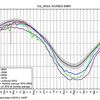Mánudagur, 22. október 2007
Merk grein eftir Dr. Daniel B. Botkin um umhverfismál, siðferði og hnatthlýnun.
 Þekktur umhverfisfræðingur, Dr. Daniel B. Botkin, skrifaði fyrir nokkrum dögum (17. okt.) grein í The Wall Street Journal. Í þessari grein koma fram mjög óvenjuleg og að mínu mati einstaklega skynsamleg sjónarmið.
Þekktur umhverfisfræðingur, Dr. Daniel B. Botkin, skrifaði fyrir nokkrum dögum (17. okt.) grein í The Wall Street Journal. Í þessari grein koma fram mjög óvenjuleg og að mínu mati einstaklega skynsamleg sjónarmið.
Hann fjallar hér m.a um afleiðingar hnatthlýnurnar fyrir lífríkið, sem hann þekkir auðvitað vel, sjónarmið kollega sinna og siðferði í vísindum, líkanagerð til að spá fyrir um framtíðina, og hvernig hann telur rétt að bregðast við hnatthlýnun.
Ísland, Grænland og Eiríkur Rauði koma við sögu í greininni.
Ég læt vera að þýða greinina þar sem flestir Íslendinga eru vel læsir á enska tungu.
(Ég litaði textann á nokkrum stöðum þar sem mér fannst athyglisverð sjónarmið koma fram).
Global Warming Delusions
By DANIEL B. BOTKIN
Mr. Botkin, president of the Center for the Study of the Environment and professor emeritus in the Department of Ecology, Evolution, and Marine Biology at the University of California, Santa Barbara, is the author of "Discordant Harmonies: A New Ecology for the Twenty-First Century" (Replica Books, 2001).
Global warming doesn't matter except to the extent that it will affect life -- ours and that of all living things on Earth. And contrary to the latest news, the evidence that global warming will have serious effects on life is thin. Most evidence suggests the contrary.
Case in point: This year's United Nations report on climate change and other documents say that 20%-30% of plant and animal species will be threatened with extinction in this century due to global warming -- a truly terrifying thought. Yet, during the past 2.5 million years, a period that scientists now know experienced climatic changes as rapid and as warm as modern climatological models suggest will happen to us, almost none of the millions of species on Earth went extinct. The exceptions were about 20 species of large mammals (the famous megafauna of the last ice age -- saber-tooth tigers, hairy mammoths and the like), which went extinct about 10,000 to 5,000 years ago at the end of the last ice age, and many dominant trees and shrubs of northwestern Europe. But elsewhere, including North America, few plant species went extinct, and few mammals.
We're also warned that tropical diseases are going to spread, and that we can expect malaria and encephalitis epidemics. But scientific papers by Prof. Sarah Randolph of Oxford University show that temperature changes do not correlate well with changes in the distribution or frequency of these diseases; warming has not broadened their distribution and is highly unlikely to do so in the future, global warming or not.
The key point here is that living things respond to many factors in addition to temperature and rainfall. In most cases, however, climate-modeling-based forecasts look primarily at temperature alone, or temperature and precipitation only. You might ask, "Isn't this enough to forecast changes in the distribution of species?" Ask a mockingbird. The New York Times recently published an answer to a query about why mockingbirds were becoming common in Manhattan. The expert answer was: food -- an exotic plant species that mockingbirds like to eat had spread to New York City. It was this, not temperature or rainfall, the expert said, that caused the change in mockingbird geography.
You might think I must be one of those know-nothing naysayers who believes global warming is liberal plot. On the contrary, I am a biologist and ecologist who has worked on global warming, and been concerned about its effects, since 1968. I've developed the computer model of forest growth that has been used widely to forecast possible effects of global warming on life -- I've used the model for that purpose myself, and to forecast likely effects on specific endangered species.
I'm not a naysayer. I'm a scientist who believes in the scientific method and in what facts tell us. I have worked for 40 years to try to improve our environment and improve human life as well. I believe we can do this only from a basis in reality, and that is not what I see happening now. Instead, like fashions that took hold in the past and are eloquently analyzed in the classic 19th century book "Extraordinary Popular Delusions and the Madness of Crowds," the popular imagination today appears to have been captured by beliefs that have little scientific basis.
Some colleagues who share some of my doubts argue that the only way to get our society to change is to frighten people with the possibility of a catastrophe, and that therefore it is all right and even necessary for scientists to exaggerate. They tell me that my belief in open and honest assessment is naïve. "Wolves deceive their prey, don't they?" one said to me recently. Therefore, biologically, he said, we are justified in exaggerating to get society to change.
The climate modelers who developed the computer programs that are being used to forecast climate change used to readily admit that the models were crude and not very realistic, but were the best that could be done with available computers and programming methods. They said our options were to either believe those crude models or believe the opinions of experienced, datafocused scientists. Having done a great deal of computer modeling myself, I appreciated their acknowledgment of the limits of their methods. But I hear no such statements today. Oddly, the forecasts of computer models have become our new reality, while facts such as the few extinctions of the past 2.5 million years are pushed aside, as if they were not our reality.
A recent article in the well-respected journal American Scientist explained why the glacier on Mt. Kilimanjaro could not be melting from global warming. Simply from an intellectual point of view it was fascinating -- especially the author's Sherlock Holmes approach to figuring out what was causing the glacier to melt. That it couldn't be global warming directly (i.e., the result of air around the glacier warming) was made clear by the fact that the air temperature at the altitude of the glacier is below freezing. This means that only direct radiant heat from sunlight could be warming and melting the glacier. The author also studied the shape of the glacier and deduced that its melting pattern was consistent with radiant heat but not air temperature. Although acknowledged by many scientists, the paper is scorned by the true believers in global warming.
We are told that the melting of the arctic ice will be a disaster. But during the famous medieval warming period -- A.D. 750 to 1230 or so -- the Vikings found the warmer northern climate to their advantage. Emmanuel Le Roy Ladurie addressed this in his book "Times of Feast, Times of Famine: A History of Climate Since the Year 1000," perhaps the greatest book about climate change before the onset of modern concerns with global warming. He wrote that Erik the Red "took advantage of a sea relatively free of ice to sail due west from Iceland to reach Greenland. . ... Two and a half centuries later, at the height of the climatic and demographic fortunes of the northern settlers, a bishopric of Greenland was founded at Gardar in 1126."
Ladurie pointed out that "it is reasonable to think of the Vikings as unconsciously taking advantage of this [referring to the warming of the Middle Ages] to colonize the most northern and inclement of their conquests, Iceland and Greenland." Good thing that Erik the Red didn't have Al Gore or his climatologists as his advisers. Should we therefore dismiss global warming? Of course not. But we should make a realistic assessment, as rationally as possible, about its cultural, economic and environmental effects. As Erik the Red might have told you, not everything due to a climatic warming is bad, nor is everything that is bad due to a climatic warming.
We should approach the problem the way we decide whether to buy insurance and take precautions against other catastrophes -- wildfires, hurricanes, earthquakes. And as I have written elsewhere, many of the actions we would take to reduce greenhouse-gas production and mitigate global-warming effects are beneficial anyway, most particularly a movement away from fossil fuels to alternative solar and wind energy.
My concern is that we may be moving away from an irrational lack of concern about climate change to an equally irrational panic about it.
Many of my colleagues ask, "What's the problem? Hasn't it been a good thing to raise public concern?" The problem is that in this panic we are going to spend our money unwisely, we will take actions that are counterproductive, and we will fail to do many of those things that will benefit the environment and ourselves.
For example, right now the clearest threat to many species is habitat destruction. Take the orangutans, for instance, one of those charismatic species that people are often fascinated by and concerned about. They are endangered because of deforestation. In our fear of global warming, it would be sad if we fail to find funds to purchase those forests before they are destroyed, and thus let this species go extinct.
At the heart of the matter is how much faith we decide to put in science -- even how much faith scientists put in science. Our times have benefited from clear-thinking, science-based rationality. I hope this prevails as we try to deal with our changing climate.
Mr. Botkin, president of the Center for the Study of the Environment and professor emeritus in the Department of Ecology, Evolution, and Marine Biology at the University of California, Santa Barbara, is the author of "Discordant Harmonies: A New Ecology for the Twenty-First Century" (Replica Books, 2001).
Ítarefni:
Viðtal við Daniel B. Botkin í New York Times
Vefsíða http://www.danielbbotkin.com
Meginflokkur: Vísindi og fræði | Aukaflokkar: Lífstíll, Stjórnmál og samfélag, Tölvur og tækni | Breytt s.d. kl. 17:26 | Facebook
Um bloggið
Ginnungagap
Ýmislegt
Loftslag
Teljari
Álverð
Sólin í dag:
(Smella á mynd)
.
Olíuverðið í dag:
Nýjustu færslur
- Kínverskur loftbelgur yfir Ameríku, og Amerískur belgur yfir ...
- Vísindavefurinn: Getum við seinkað klukkunni á Íslandi og fen...
- Sjálfstæðisflokkurinn með tæplega 19% meira fylgi en Samfylki...
- Bjarni Sigurðsson harmonikkusnillingur frá Geysi. Fáein orð...
- Hvers vegna valdi Apple ekki Ísland fyrir gagnaver...?
Heimsóknir
Flettingar
- Í dag (19.7.): 0
- Sl. sólarhring: 11
- Sl. viku: 105
- Frá upphafi: 0
Annað
- Innlit í dag: 0
- Innlit sl. viku: 74
- Gestir í dag: 0
- IP-tölur í dag: 0
Uppfært á 3 mín. fresti.
Skýringar
Tenglar
Tenglar
Ýmsar vefsíður
- Efnisyfirlit pistla
- Lofthiti - Sjávarstaða - Hafís - Sólvirkni... Beintengdir ferlar
- Club du Soleil Greinar um samaspil sólar og veðurfars
- Stjörnufræðivefurinn
- Astronomy Picture of the Day
- Climate4you
- Watts Up With That?
- World Climate Report
- CO2 Science
- The Reference Frame
- Climate-Audit
- ICECAP
- The Air Went
- Science Sceptical Blog
- Roy Spencer
- Friends of Sience
- Prometheus
- Öldur aldanna. Sjaldan er ein báran stök - einnig í veðurfari? (2003) Vefsíða ÁHB
- Gróðurhúsaáhrif eða eðlilegar sveiflur í virkni sólar? (Grein í Lesbók Mbl. 20. júní 1998) Höfundur Ágúst H. Bjarnason
- Er jörðin að hitna?-Ekki er allt sem sýnist (1998) Vefsíða ÁHB
Uppskriftir
Ýmsar mataruppskriftir
Myndaalbúm
Bloggvinir
-
 majab
majab
-
 ragu
ragu
-
 amadeus
amadeus
-
 andres08
andres08
-
 apalsson
apalsson
-
 asabjorg
asabjorg
-
 askja
askja
-
 astromix
astromix
-
 baldher
baldher
-
 biggibraga
biggibraga
-
 bjarkib
bjarkib
-
 bjarnijonsson
bjarnijonsson
-
 bjarnimax
bjarnimax
-
 bjorn-geir
bjorn-geir
-
 blindur
blindur
-
 bofs
bofs
-
 brandarar
brandarar
-
 daliaa
daliaa
-
 darwin
darwin
-
 duddi9
duddi9
-
 ea
ea
-
 egillsv
egillsv
-
 einari
einari
-
 einarstrand
einarstrand
-
 elinora
elinora
-
 elvira
elvira
-
 emilhannes
emilhannes
-
 esv
esv
-
 eyjapeyji
eyjapeyji
-
 fhg
fhg
-
 finder
finder
-
 finnur
finnur
-
 fjarki
fjarki
-
 flinston
flinston
-
 frisk
frisk
-
 gattin
gattin
-
 geiragustsson
geiragustsson
-
 gillimann
gillimann
-
 gretaro
gretaro
-
 gthg
gthg
-
 gudmbjo
gudmbjo
-
 gudni-is
gudni-is
-
 gummibraga
gummibraga
-
 gun
gun
-
 gutti
gutti
-
 haddi9001
haddi9001
-
 halldorjonsson
halldorjonsson
-
 halldors
halldors
-
 hlini
hlini
-
 hof
hof
-
 hordurhalldorsson
hordurhalldorsson
-
 hreinsamviska
hreinsamviska
-
 hronnsig
hronnsig
-
 hugdettan
hugdettan
-
 icekeiko
icekeiko
-
 ingibjorgelsa
ingibjorgelsa
-
 jakobbjornsson
jakobbjornsson
-
 jakobk
jakobk
-
 johannesthor
johannesthor
-
 johnnyboy99
johnnyboy99
-
 jonaa
jonaa
-
 jonasgunnar
jonasgunnar
-
 jonmagnusson
jonmagnusson
-
 jonpallv
jonpallv
-
 jonthorolafsson
jonthorolafsson
-
 juliusvalsson
juliusvalsson
-
 karljg
karljg
-
 katrinsnaeholm
katrinsnaeholm
-
 kikka
kikka
-
 kje
kje
-
 klarak
klarak
-
 kolbrunb
kolbrunb
-
 krissiblo
krissiblo
-
 ksh
ksh
-
 kt
kt
-
 lehamzdr
lehamzdr
-
 liljabolla
liljabolla
-
 lillagud
lillagud
-
 lindalea
lindalea
-
 lucas
lucas
-
 maeglika
maeglika
-
 maggij
maggij
-
 maggiraggi
maggiraggi
-
 marinomm
marinomm
-
 martasmarta
martasmarta
-
 marzibil
marzibil
-
 mberg
mberg
-
 midborg
midborg
-
 minos
minos
-
 morgunbladid
morgunbladid
-
 mosi
mosi
-
 mullis
mullis
-
 naflaskodun
naflaskodun
-
 nimbus
nimbus
-
 nosejob
nosejob
-
 omarbjarki
omarbjarki
-
 ormurormur
ormurormur
-
 palmig
palmig
-
 perlaoghvolparnir
perlaoghvolparnir
-
 peturmikli
peturmikli
-
 photo
photo
-
 possi
possi
-
 prakkarinn
prakkarinn
-
 raggibjarna
raggibjarna
-
 rattati
rattati
-
 ravenyonaz
ravenyonaz
-
 redlion
redlion
-
 rs1600
rs1600
-
 rynir
rynir
-
 saemi7
saemi7
-
 sesseljamaria
sesseljamaria
-
 sigfus
sigfus
-
 sigurgeirorri
sigurgeirorri
-
 sjalfstaedi
sjalfstaedi
-
 sjerasigvaldi
sjerasigvaldi
-
 skari60
skari60
-
 skulablogg
skulablogg
-
 sleggjudomarinn
sleggjudomarinn
-
 stebbix
stebbix
-
 steinibriem
steinibriem
-
 steinnhaf
steinnhaf
-
 stinajohanns
stinajohanns
-
 stjornuskodun
stjornuskodun
-
 storibjor
storibjor
-
 straitjacket
straitjacket
-
 summi
summi
-
 tannibowie
tannibowie
-
 thil
thil
-
 thjodarskutan
thjodarskutan
-
 throsturg
throsturg
-
 toro
toro
-
 tryggvigunnarhansen
tryggvigunnarhansen
-
 valdimarjohannesson
valdimarjohannesson
-
 valdinn
valdinn
-
 vefritid
vefritid
-
 vey
vey
-
 vidhorf
vidhorf
-
 vig
vig
-
 visindin
visindin
-
 vulkan
vulkan
-
 kristjan9
kristjan9
-
 arkimedes
arkimedes
-
 kliddi
kliddi
-
 eliasbe
eliasbe
Eldri færslur
- Febrúar 2023
- Janúar 2019
- Maí 2018
- Júlí 2017
- Maí 2017
- Febrúar 2017
- Janúar 2017
- Nóvember 2016
- Október 2016
- September 2016
- Júlí 2016
- Apríl 2016
- Mars 2016
- Febrúar 2016
- Janúar 2016
- Desember 2015
- Nóvember 2015
- Október 2015
- Ágúst 2015
- Júní 2015
- Maí 2015
- Apríl 2015
- Mars 2015
- Febrúar 2015
- Janúar 2015
- Desember 2014
- Nóvember 2014
- Október 2014
- September 2014
- Ágúst 2014
- Júlí 2014
- Júní 2014
- Maí 2014
- Apríl 2014
- Mars 2014
- Febrúar 2014
- Janúar 2014
- Desember 2013
- Nóvember 2013
- Október 2013
- September 2013
- Ágúst 2013
- Júlí 2013
- Júní 2013
- Maí 2013
- Apríl 2013
- Mars 2013
- Febrúar 2013
- Janúar 2013
- Desember 2012
- Nóvember 2012
- September 2012
- Ágúst 2012
- Júlí 2012
- Júní 2012
- Maí 2012
- Apríl 2012
- Mars 2012
- Febrúar 2012
- Janúar 2012
- Desember 2011
- Nóvember 2011
- Október 2011
- September 2011
- Ágúst 2011
- Júlí 2011
- Júní 2011
- Apríl 2011
- Mars 2011
- Febrúar 2011
- Janúar 2011
- Desember 2010
- Nóvember 2010
- Október 2010
- September 2010
- Ágúst 2010
- Júlí 2010
- Júní 2010
- Maí 2010
- Apríl 2010
- Mars 2010
- Febrúar 2010
- Janúar 2010
- Desember 2009
- Nóvember 2009
- Október 2009
- September 2009
- Ágúst 2009
- Júlí 2009
- Júní 2009
- Maí 2009
- Apríl 2009
- Mars 2009
- Febrúar 2009
- Janúar 2009
- Desember 2008
- Nóvember 2008
- Október 2008
- September 2008
- Ágúst 2008
- Júlí 2008
- Júní 2008
- Maí 2008
- Apríl 2008
- Mars 2008
- Febrúar 2008
- Janúar 2008
- Desember 2007
- Nóvember 2007
- Október 2007
- September 2007
- Ágúst 2007
- Júlí 2007
- Júní 2007
- Apríl 2007
- Mars 2007
- Febrúar 2007
- Janúar 2007
- Desember 2006
- Nóvember 2006
- Október 2006
- September 2006
Færsluflokkar
- Bloggar
- Bækur
- Dægurmál
- Evrópumál
- Ferðalög
- Fjármál
- Fjölmiðlar
- Heilbrigðismál
- Heimspeki
- Íþróttir
- Kjaramál
- Kvikmyndir
- Lífstíll
- Ljóð
- Löggæsla
- Mannréttindi
- Matur og drykkur
- Menning og listir
- Menntun og skóli
- Samgöngur
- Sjónvarp
- Spaugilegt
- Spil og leikir
- Stjórnmál og samfélag
- Sveitarstjórnarkosningar
- Tónlist
- Trúmál
- Trúmál og siðferði
- Tölvur og tækni
- Umhverfismál
- Utanríkismál/alþjóðamál
- Vefurinn
- Viðskipti og fjármál
- Vinir og fjölskylda
- Vísindi og fræði






Athugasemdir
Þakka þér kærlega fyrir að setja þessa grein á síðuna. Þetta er stórmerkileg lesning. Sjálfur tel ég lítinn vafa leika á, að við erum á einhvers konar hlýindaskeiði, hversu lengi sem það varir, og ég bý alls ekki yfir nægilegri þekkingu til að afneita því með fullri vissu, að hlýnunin sé að einhverju leyti af mannavöldum (þó að það þurfi alls ekki að vera heldur). En hver er váin? Hvar er vandinn? Ég botna ekkert í því, hvers vegna fólk talar um það sem heimsendi, ef það hlýnar til dæmis næstu hundrað ár um svipað og síðustu hundrað ár, röskt hálft hitastig. Væri vandinn ekki, ef kólnaði? Viljum við hafísinn aftur, landsins forna fjanda? HHG
Hannes Hólmsteinn Gissurarson, 22.10.2007 kl. 17:42
Predikarinn - Cacoethes scribendi , 22.10.2007 kl. 19:44
Kærar þakkir fyrir þessa grein. Mjög merkileg finnst mér. Ég hef verið að reyna að halda uppi áróðri um að maðurinn hafi ekki eins mikil áhrif á náttúruna eins og haldið er fram af mörgum vísindamönnum. Ég læt nú yfirleitt kjafta mig í kaf, hef ekki þannig lagað vit á þessum málum, en nota meira árin sem ég hef lifað og þær upplýsingar sem ratað hafa inn í heila minn í gegnum árin og svo brjóstvitið til að mynda mér mínar eigin skoðanir. En semsagt, þessi grein var virkilega ánægjulega lestrar fyrir mig. Takk kærlega og Kær kveðja.
Ásdís Sigurðardóttir, 22.10.2007 kl. 20:16
Sæl Ásdis og þakka þér fyrir athugasemdirnar. Hinn gullni meðalvegur við nýtingu náttúruauðlinda er alltaf bestur, en til þess að hægt sé að þræða hann er nauðsynlegt að þekkja leiðina. Það er ekki hægt öðru vísi en að skoða málin frá öllum hliðum, en ekki einblína á eina hlið. Það er mjög slæmt þegar menn telja að þeir viti allt sem vita þarf og hætta að hugsa. Þá fyrst er voðinn vís.
Kjarni málsins í grein Daniels er einmitt að mikilvægt sé að nota þekkingu okkar og heilbrigða skynsemi. Ekki stunda hræðsluáróður og fara gera eitthvað illa grundað vegna hræðslu. Þekki maður óvininn, þá er óþarfi að vera hræddur við hann.
Líklega hef ég svipaða skoðun á þessum málum eins og þú lýsir, og hef lengi haft áhuga á því að skoða hvað annað en athafnir okkar geti valdið breytingu á hitastigi lofthjúpsins. Reyni þó að fullyrða ekki of mikið eins og þú sérð ef þú lest greinastúfa eftir mig um málið sem eru faldir undir liðnum Tenglar hér vinstra megin. Auðvitað nota menn stundum stór orð til að ná athygli, en það er bara mannlegt.
Takk fyrir heimsóknina og bestu kveðjur.
Ágúst H Bjarnason, 22.10.2007 kl. 21:35
Sæll Hannes.
Það sem mér finnst vera merkilegast í greininni er hvaða áherslu höfundurinn leggur á að vísindamenn forðist hræðsluáróður og fari að reyna að velta málunum fyrir sér á yfirvegaðan hátt. Botkin hefur mjög mikla þekkingu á umhverfismálum og býr yfir gríðarmikilli reynslu. Honum leiðist greinilega sá hroki sem margir misvitrir vísindamenn sýna oft á tíðum. Líklega eru það vísindamenn sem telja sig vita allt, en gera sér enga grein fyrir hve takmörkuð þekking þeirra er í reynd.
Það er reyndar eftirtektarvert hve stór hluti þeirra vísindamanna, sem þorir að spyrja spurninga og láta í ljós einhverjar efasemdir, er kominn á eftirlaun. Getur verið að ástæðan sé sú að drifkraftur þessara rannsókna sé rannsóknastyrkir? Ótrúlegur fjöldi vísindamanna fæst við rannsóknir á afleiðingum hnatthlýnunar sem nemur aðeins um 0,7 gráðum á heilli öld, eða álíka og hitamunurinn er milli tveggja staða þar sem hæðarmunurinn er aðeins 100 metrar. Svipað og Nauthólsvík-Perlan. Menn fá auðvitað ekki styrki ef þeir eru ekki á réttri línu. Því kjósa margir hinna yngri að þegja, að minnsta kosti opinberlega.
Ágúst H Bjarnason, 22.10.2007 kl. 21:57
Það eru sem betur fer margir eins þenkjandi og Botkin og við þurfum ekki að vera vísindamenn til að sjá að það hefir verið farið allt of langt í að hræða fólk jáfnvel á að sjórin muni flæða yfir hús þeirra. Ég hef sett margar svona greinar inn hér og það er gott að fleiri hjálpi til að uppfræða fólk. Við þurfum bara að muna eftir klofajökli og svo höfum við alla jökla borkjarnanna sem segja ökkur sögu. Kv V
Valdimar Samúelsson, 22.10.2007 kl. 23:08
Slempinn Það er ekki meðal hitastig gufuhvolvsins sem ræður veðri
hldur hitamunur frá einum stað til annars. þannig myndast lægðir og
hæðir sem mynda veðurlag. Veðrið í dag er ekki verra en verðið hefur
það er meira um fréttir af veðri en áður.
Básenda óveðrið var á tíma þegar kallt loftslag ríkti (littla ísöld).
Leifur Þorsteinsson, 23.10.2007 kl. 00:02
Ég hef spurt hver hin raunverulega hætta af hnatthlýnunni sé og það merkilega er að enginn hefur getað svarað því af einhverju viti, ekki heldur Al Core. Spurningin er fyllilega réttmæt hvers vegna íbúar þeirra svæða á jörðinni sem koma til með að hagnast á hlýnuninni eigi ekki bara að gleðjast, hvað með risavaxin landsvæði í Kanada og Rússlandi sem verða byggileg með hlýrra loftslagi? Ég held að meirihluti mannskins græði á þessu og þeir sem tapa eru í minnihluta. Það sem meira er að þau svæði sem fara illa út úr þessum breytingum eru tiltölulega fámenn þannig að það er mikið gáfulegra að bregðast við á staðbundinn hátt þar sem vandamálíð verður augljóst en ekki að gera bara eitthvað. Það er sjálfsagt mál að draga sem mest úr mengun hvort sem það hefur áhrif á veðurfarið eða ekki, kemur málinu bara ekkert við.
Guðmundur Geir Sigurðsson, 23.10.2007 kl. 15:04
Mig langaði aðeins að bæta við færslu mína í gær að ég er mjög mikill náttúruunnandi og geng afskaplega vel um landið okkar og hef kennt afkomendum mínum slíkt hið sama, maðurinn á auðvitað að lifa í sátt við umhverfi sitt, en við þurfum líka að nýta auðlindir okkur til framdráttar. Heimurinn eins og við þekkum hann í dag er ekki kominn til að vera um alla eilífð, það er ég viss um.
Ásdís Sigurðardóttir, 23.10.2007 kl. 16:26
Ásdís, það er vissulega mikilvægt að temja sér að ganga vel um landið. Helst á maður að reyna að bæta það ef hægt er. Ég uni mér oft vel við að græða upp ofbeittan landskika sem ég á og planta hæfilega miklu af trjám. Þó svo að trén séu ekki orðin hávaxin, þá eru þau þegar farin að laða fugla að og mynda skjól. Sjá færsluna Skógrækt áhugamannsins.
Guðjón, það er auðvitað margt sem hægt er að gera. Daníel bendir á eitt atriði sem dæmi, þú minnist á baráttu gegn eyðingu frumskóganna. Hvort tveggja mjög jákvætt. Hér á Íslandi eyddu forfeður okkar af illri nauðsyn þem frumskógi sem hér var áður en landið byggðist. Nú leggja margir hönd á plóginn til að græða landið á nýjan leik.
Listinn yfir helstu mál sem þyrfti að leysa yrði væntanlega mjög langur. Líklega er best að byrja á því að hver og einn líti í kring um sig og hugi að sínu umhverfi.
Ágúst H Bjarnason, 23.10.2007 kl. 21:12
Ég horfði á sínum tíma á Global Warming Swindle og hef lesið bloggin þín svo mér datt í hug að þú hefðir lent í því að vera kallaður Samsæriskenninga Klikkhaus til að þagga niður í þér.
Það er heilbrigð og ábyrg hegðun allra borgara sem annt er um samfélag sitt að rannsaka og ræða um hvaða valdhafar hafi hugsanlega átt samráð um sína hagsmuni á kostnað borgaranna. Svo ég skrifaði blog til að svara þessu hrædda fólk:
Faðir frjálshyggjunnar var Samsæriskenninga KlikkhausGóðar stundir :)
Jón Þór Ólafsson, 5.11.2007 kl. 18:50
Bæta við athugasemd [Innskráning]
Ekki er lengur hægt að skrifa athugasemdir við færsluna, þar sem tímamörk á athugasemdir eru liðin.